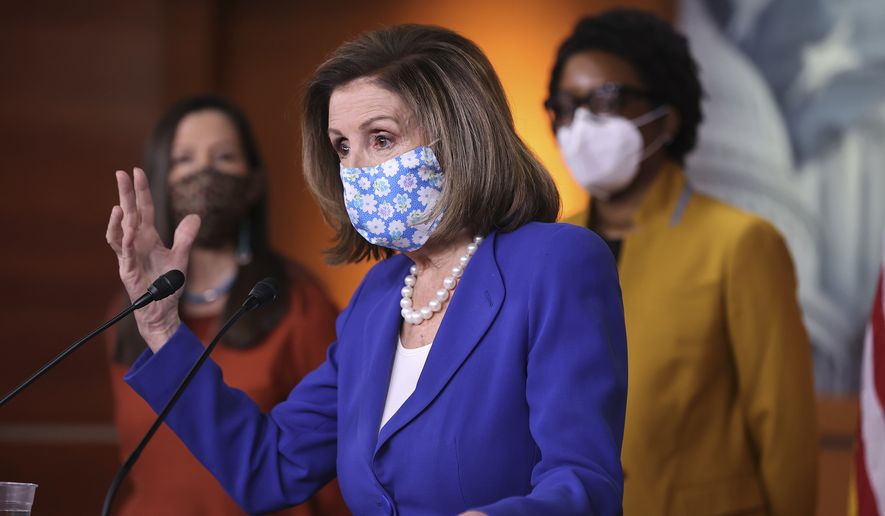House Democrats celebrated the 11th anniversary of Obamacare on Tuesday by rolling out 18 bills they say would further improve the nation’s health care system by cracking down on what they called “junk plans.”
They lauded former President Barack Obama’s signature health care law as a resounding success despite Republicans undermining it, including stripping away the individual mandate to buy insurance that was at the heart of the law.
“For 11 years, the landmark Affordable Care Act has expanded coverage, lowered costs and secured lifesaving protections for hard-working families. Today, the ACA stands as a great pillar of economic and health security for the American people, alongside Social Security, Medicare and Medicaid,” said House Speaker Nancy Pelosi.
She said Democrats will not stop there.
“On this anniversary, Democrats renew our commitment to strengthen and expand the ACA’s lifesaving protections — because quality, affordable health care must be a right, not a privilege, for all,” the California Democrat said.
Republicans decried the renewed Obamacare push as a partisan approach to healthcare that would increase federal spending, limit consumer choice and pave the way for a government-run health care system.
“The bills continue us on a path toward the socialized medicine that President Obama started,” said Rep. Cathy McMorris Rodgers of Washington, the top Republican on the House Energy and Commerce Committee. “I’m concerned we’re focused on what’s dividing us.”
Speaking at a health care subcommittee hearing where Democrats presented the 18 new health care bills, Ms. McMorris Rogers said the legislation would help cement the partisan divide in Congress.
The bills include a proposal to limit how long people can buy short-term insurance policies. The bill proposed by Democratic Reps. Kathy Castor of Florida and Brian Higgins of New York would undo a Trump administration policy that increased how long people can have the short-term, less-expensive insurance from three months to a year.
Consumer groups assailed the cheaper plans, which are exempt from Obamacare’s regulations, for not covering some medical costs such as hospitalizations and sometimes not paying claims related to preexisting conditions.
“To me, if you buy a plan that doesn’t cover hospitalizations, you don’t have health insurance,” said Rep. Frank Pallone Jr., New Jersey Democrat and chairman of the Energy and Commerce Committee.
But Dean Cameron, director of the Idaho Department of Insurance, told lawmakers that some short-term plans are better than the longer-term plans sold on the Obamacare marketplace. They also provide consumers the choice of buying less expensive insurance than the more fully loaded Obamacare plans.
Several states responded to the concerns about the plans by passing laws regulating them, including preventing them from denying coverage based on preexisting conditions, he said.
Further reducing how long people can keep the insurance would lead more to go uninsured, he warned.
“The implication is that somehow it’s better to be without coverage than to have coverage that is inferior,” he said. “I don’t understand that.”
Rep. Brett Guthrie of Kentucky, the health subcommittee’s top Republican, lamented “one-size-fits-all government-run health care.”
“I’m concerned innovation would stop fully under a government-run health care program,” he said.
Among the other bills being pushed by Democrats are several measures that would increase spending to market Obamacare by hundreds of millions of dollars a year, after President Trump, a critic of the Affordable Care Plan, cut the program’s advertising spending.
A bill by Rep. Ami Bera, California Democrat, would provide $200 million a year to states to increase awareness of the health care program. Another measure by Reps. Lisa Blunt Rochester, Delaware Democrat, and Mary Gay Scanlon, Pennsylvania Democrat, would provide another $100 million annually to fund consumer outreach for Obamacare by the Department of Health and Human Services. Ms. Castor also is proposing to give nonprofit groups an additional $100 million a year to spread the word about Obamacare.
A bill from Democratic Reps. Cynthia Axne of Iowa, Doris Matsui of California and Steven Horsford of Nevada would undo a technical change by the Trump administration in how the government determines the income of people receiving Obamacare subsidies.
The change saved the federal government $1 billion annually. But it resulted in about 7 million people being considered to have higher incomes than before and paying more for their insurance, according to the Center on Budget and Policy Priorities, a liberal Washington think tank.
Under a provision in President Biden’s $1.9 trillion coronavirus relief bill, Congress offered an incentive to the 12 states that have not expanded Medicaid to people with moderate incomes. The government offered to pick up more of the cost for low-income people already covered under traditional Medicaid, which is expected to more than offset the cost to states of insuring more people.
A bill by Rep. Marc Veasey, Texas Democrat, would go further. The federal government would pick up the entire cost to states of expanding Medicaid for three years, up from the 90%.
Some Republican governors have rejected the idea of expanding Medicaid in their states, fearing the long-term costs. But the Republican-dominated House in Wyoming approved a bill late Monday night authorizing the state’s governor to expand the program.
“Millions have been locked out of health coverage, despite being poor because governors and state legislatures have not acted,” said Rep. Anna Eshoo, California Democrat and chairwoman of the health subcommittee.
Mr. Guthrie criticized the Democratic bills, saying they do not address what he considers to be the biggest program preventing people from having health insurance — the cost.
“Democrats have chosen to address it by pouring more money and limiting state flexibility,” he said.
• Kery Murakami can be reached at kmurakami@washingtontimes.com.




Please read our comment policy before commenting.